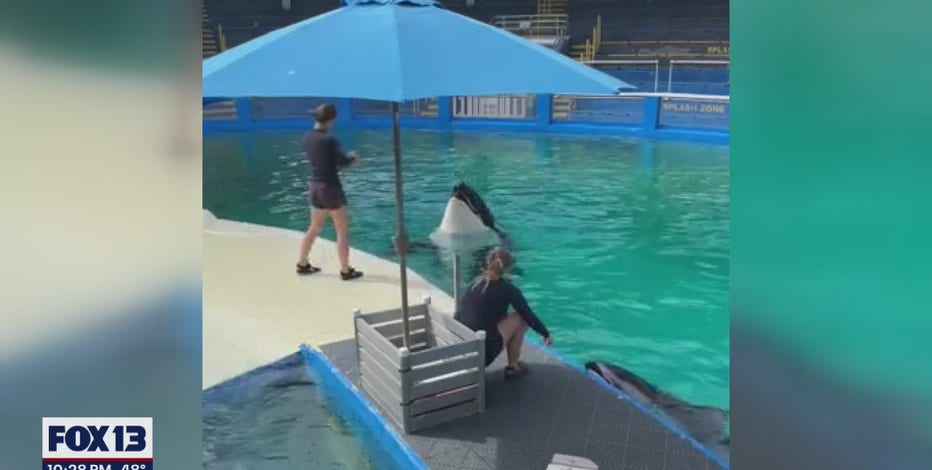Tokitae's health improving, locals hope it opens the door to her return home
SEATTLE - Feared to be deathly ill, Tokitae – an orca plucked from the Salish Sea in 1970 – is on the mend, according to veterinarians.
The news is being met with optimism as activists have held onto hope for years that she could one day return to her ancestral waters.
While many more steps lie ahead, two recent developments are offering hope: the latest news from veterinarians, and the recent decision to "retire" Tokitae from performances.
"This is the first step for her, to understand how she’s doing," said Charles Vinick, the executive director of The Whale Santuary Project.
Tokitae, who has been called Lolita while performing and Sk’aliCh’elh-tenaut by her Lummi relatives, has lived in a small tank for roughly 52 years. Earlier this year news broke that she was severely ill – the new vet report released by ‘Friends of Lolita,’ indicates that she’s now on the mend.
Featured
'Let's bring her home'; Hopes renewed to bring Tokitae the orca back to Puget Sound
A team of independent veterinarians has been invited to the Miami Seaquarium to examine Tokitae the orca, and many are hoping she is in good health to one day return to Puget Sound.
As Vinick explained to FOX 13, the fact that their independent veterinarians were even allowed to make contact was a major step. The park’s new owners, The Dolphin Company, has been more open to communication with outside groups interested in Tokitae’s future. The group is even expected to release monthly reports online.
"Having that level of transparency, is frankly, unprecedented in terms of Lolita’s life," said Vinick. "We’ve not had this opportunity before to bring independent veterinarians into a discussion to evaluate her."
The aspirational goal, according to Vinick, is to move her back to the Pacific Northwest. In fact, his team has long been working the Sacred Lands Conservancy (Sacred Seas) on a living document that outlines steps that would need to take place. However, both Vinick and Sacred Seas have made it clear they can’t rush progress.
"We’re letting Sk’aliCh’elh-tenaut lead us," said Squil-le-he-le (Raynell Morris), a Lummi tribal member and vice president of Sacred Sea. "We love and respect her. She’s been there over 52 years – so it has to be in the most sensitive, loving and caring way for her. It’s not about my timeframe. If it was, I’d have had her home. That’s not what’s best for her."
Morris told FOX 13 that they’re working with the Miami Seaquarium to slowly adjust her enrichment program – they’ve started to pump calming, natural sounds into the stadium where her tank is. She hopes that they’ll consider adding other elements that would re-associate her with the Salish Sea including sights and sounds that would be common here.
Featured
Miami Seaquarium ending shows with aging orca taken from Puget Sound
The new owners of the Miami Seaquarium will no longer stage shows with its aging orca Lolita, originally named Tokitae, under an agreement with federal regulators.
The story of Tokitae stretches back to the late 60s and 70s when groups rounded up members of the Southern Resident orca pods and captured them for sale. Whale catchers would toss noisemakers into the water to herd orca like cattle into a narrow area – then they’d block the entrance to pull the babies out of the water. Dozens of orca were captured this way. Tokitae is the only whale from those captures that is still alive.
The history of whales being removed from the Salish Sea is even more challenging when you consider their current plight – Tokitae is a member of L-Pod, part of the Southern Resident orcas. Less than 80 are alive today, and they’re considered an endangered species in both the U.S. and Canada.
While too old to birth new calves, there is hope she can contribute to her pod. Orcas are a highly intelligent species with their own complex form of communication. They have complex relationships, and a social hierarchy.
Lummi Nation calls the Southern Residents qwe ‘lhol mechen,’ or ‘our relations under the waters.’ As Morris explains, their hurt is reflected in her tribe.
"We care about all the Southern Resident killer whales," she said. "They’re our relatives – when they’re hurting it reflects us. We mirror that pain in our family and in our community."



